Tag Archive: aphasia
June 30, 2019
by Carole Zangari -
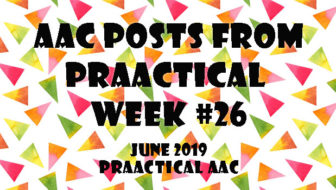
Happy Sunday, AAC friends! We’ve got a few posts for you to browse through from our prAACtical week. Monday – How I Do It: Pocket Flipbooks for Teens Tuesday – AAC Link Up Wednesday – Video of the Week: Activities to Use in AAC Training Thursday – PrAACtically July: AAC Resources for A Year of Core Vocabulary :::::::::::::::::::::::::::::::::::::::::::::::::::::::::::::::::::::::::::::::::::::::::::::::::::::::::::::::::::::::::::: Before you go, take a look and see if any of these are of interest. AAC Assessment Forms AAC Printables & Downloads AAC Assessment for People with Aphasia Book Adaptations: Resources and Materials 5 Ways to Use Books to Build Interaction with AAC Learners
Filed under: Featured Posts, PrAACtical Thinking
Tagged With: aphasia, assessment, Books, Year of Core
June 23, 2019
by Carole Zangari -
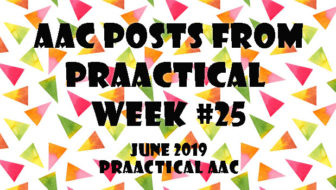
Happy Sunday, AAC friends. Have some catching up to do? You’ve come to the right place. Monday – How I Do It: Pocket Flipbooks for Adults & Teens, Part 2 Tuesday – AAC Link Up Wednesday – Video of the Week: Using Sensory Activities to Build Communication & Literacy with Students who Have Visual & Multiple Disabilities Thursday – When Language Is Lost: AAC Supports for Individuals with Aphasia ::::::::::::::::::::::::::::::::::::::::::::::::::::::::::::::::::::::::::::::::::::::::::::::::::::::::::::::::::::::::::::::::::::::::::::::::::: Are you looking for some AACtivity suggestions? Here’s a few from past posts. Sometimes I Feel Sunny: AT Recipes for Success from CHoR PrAACtical Supports for AAC Learners: AT Recipes for Success – Sensorimotor Activities Pete the Cat, Rockin’ in My School Shoes: AT Recipes for Success PrAACtical Supports for the Young AAC Learner: Recipes for Success (Bubbles, Cars) PrAACtical Supports for Older Learners: AT Recipes for Success (Computer, Scrapbooking)
Filed under: Featured Posts, PrAACtical Thinking
Tagged With: activities, aphasia, flipbook, sensory activities
June 20, 2019
by Carole Zangari -
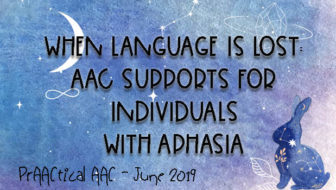
It’s another Throwback Thursday! In recognition of Aphasia Awareness Month, we are digging into the archives for content on supporting people who’ve lost a good deal of language following stroke, brain injury, or dementia. If this is a population of interest, we invite you to explore these past posts to get ideas of things to add to your AAC assessment and/or therapy. Making It Work: 6 AAC Strategies for People with Aphasia Low Tech AAC for Adults with Aphasia: What Does That Mean? A Fresh Look at AAC & Aphasia with Dr. Kristy Weissling 5 Questions about Aphasia & Communication Books Aphasia Awareness Month: AAC & Aphasia Bridging the Gap: Helping People with Aphasia to Compensate for Their Language Difficulties AAC Assessment for People with Aphasia
Filed under: Featured Posts, PrAACtical Thinking
Tagged With: aphasia, throwback, visual scene displays
June 12, 2014
by Carole Zangari -
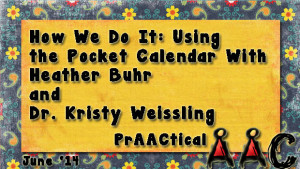
We are happy to welcome back our friend and colleague, Dr. Kristy Weissling, and her student Heather Buhr, who are sharing more information about an AAC tool they are using to support people with aphasia. Take a look at their Pocket Calendars, which may be beneficial to clients with other kinds of communication difficulties as well. You can see their original post, Low-Tech AAC for Adults with Aphasia, here. ::::::::::::::::::::::::::::::::::::::::::::::::::::::::::::::::::::::::::::::::::: In our last post we examined the differences between memory books and communication books. As promised, we are back again to share with you a low-tech “device” that we have been recently using- the pocket calendar. It’s simple, easy to use, comes together in a snap, and is probably familiar to your clients. We will review how our clients are using these pocket calendars, why we find them effective, and how to put one... [Read More...]
Filed under: PrAACtical Thinking
Tagged With: aphasia, communication book, Heather Buhr, Kristy Weissling, Pocket Calendar
May 27, 2014
by Carole Zangari -
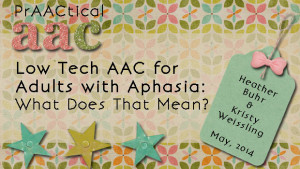
Aphasia Awareness Month is just around the corner, and getting us ready for that is this wonderful post on using low tech AAC with people who have aphasia. We’re delighted to welcome back our friend and colleague, Dr. Kristy Weissling, who is collaborating with Heather Buhr, to share some thoughts on this topic. ::::::::::::::::::::::::::::::::::::::::::::::::::::::::::::: For many, the term Augmentative and Alternative (AAC) brings to mind technology, speech-generating devices, and now – more than ever before – iPads. But as we know, AAC encompasses much more than that. We all use AAC when we make facial expressions or gestures, use symbols or pictures, or write. We would like to explore AAC and more “low-tech” options that help our clients express their thoughts, needs, wants, and ideas. Low-tech strategies can range from the use of written choice, to communication boards, to communication books. In this article we will specifically address communication... [Read More...]
Filed under: PrAACtical Thinking
Tagged With: aphasia, communication book, Heather Buhr, Kristy Weissling, low tech
July 5, 2013
by Robin Parker -
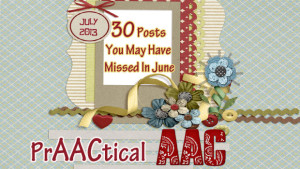
Strategy of the Month AAC Assessment for People with Aphasia Communication Books & Aphasia Speech Supplementation Strategies Aphasia, Supported Communication, Written Choice Strategy, + Variations Making it Work: 6 AAC Strategies for People with Aphasia PrAACtical Thinking Be Chatty: 5 Tips for Supported Conversation 5 PrAACtical Thoughts on Catch-Up Conversations 31 Posts You May Have Missed in May Where to Get PrAACtical Research Reviews Supporting the Use of AAC Listen to Me About What I Need and Want It’s PrAACtically Fathers Day PrAACtical Summer Learning 5 Questions about Aphasia & Communication Books Safety Matters: 5 Resources for People Who Use AAC Weighing The Evidence PrAACtical Evidence on Presuming Competence Helping People with Aphasia Compensate for Their Language Difficulties with Dr. Kristy Weissling PrAACtical Summer Activities AACtual Therapy/ How I Do It Go Fish with AAC and Shareka Bentham Marlene Cummings Shares and Implementation Toolbox Use your Best Spud to Teach Vocabulary... [Read More...]
Filed under: PrAACtical Thinking
Tagged With: AAC assessment, aphasia, COmmunication Books, Supported Communication, written choice strategy
June 29, 2013
by Carole Zangari -
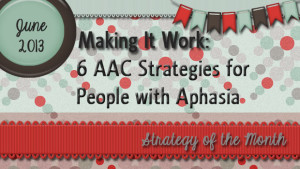
People with aphasia are often most successful when a number of different strategies are combined. In this post, we discuss a number of strategies that we can use in our therapy and teach to communication partners. Augmented Input We’ve written so many posts about aided language input that we’re almost embarrassed to bring it up again. Almost. It seems like no matter which age group or clinical population is the subject of our post, that strategy plays a central role. It is the same for people with aphasia with one exception. They benefit from a broader array of input cues, such as gestures, writing, and even pantomime. Augmented input is the term that is used to refer to oral language that is supplemented with pictures, print, gestures, pantomime, and the use of objects in the environment. By using these things as you speak, you enhance the ability of the person... [Read More...]
Filed under: Strategy of the Month
Tagged With: aided language input, aphasia, augmented input, communication book, rating scale, supplementation, tagged questions, written choice strategy
June 26, 2013
by Carole Zangari -
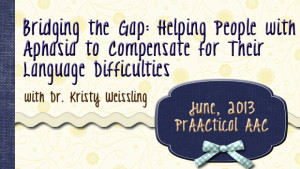
We’re wrapping up Aphasia Month with another fine post from Dr. Kristy Weissling. You can see her earlier posts here and here. In this post, Kristy shares her thoughts on how SLPs can use AAC supports to help individuals with aphasia compensate for their language difficulties. In 2010, my colleague, Carrie Prentice, and I talked about the role of both remediation and compensation in the speech rehabilitation programs of people with aphasia. At that time, we were trying to emphasize that at any particular time in the rehabilitation process, from acute care to outpatient rehabilitation, all possible alternatives should be balanced to create an individualized treatment program. Both restorative and compensatory mechanisms are available to therapist throughout this process. We proposed the work of Dixon, Garrett, and Backman (2008) to formulate a framework for discussing compensation. Six mechanisms of compensation were identified in their chapter on principles of compensation in... [Read More...]
Filed under: PrAACtical Thinking
Tagged With: aphasia, EBP, evidence, Kristy Weissling
June 22, 2013
by Robin Parker -
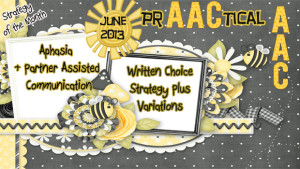
This month, we have enjoyed writing about communication strategies for aphasia. Partner supported communication is the platform for many of the effective techniques we use to help people with aphasia initiate, maintain, or terminate communication and conversation. We have talked about assessment strategies, communication books, and alphabet & topic supplementation. Now it is time to discuss the written choice strategy. The written choice strategy is fairly easy to implement, can look natural, and can result in seamless detailed conversation. Written choices are provided in the context of conversation and are displayed in an organized manner. What is It? The written choice strategy has the partner/facilitator generating written key-word choices that relate to the conversational topic. The written choices can be paired with text, pictures, drawings, symbols, and natural speech. The partner/facilitator writes possible answers to conversational questions in list form. The conversation is extended as continued written choices are offered... [Read More...]
Filed under: Strategy of the Month
Tagged With: aphasia, rating scales, Supported Communication, written choice strategy
June 19, 2013
by Carole Zangari -
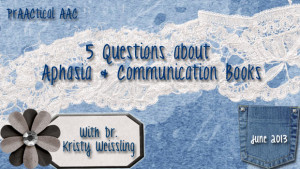
Today, we welcome back Dr. Kristy Weissling who shared some detailed thoughts on using AAC to support people with aphasia in this earlier post. In this post, she gets us thinking about what might be behind a situation familiar to many SLPs: Under-utilization of the AAC support/ :::::::::::::::::::::::::::::::::::::::::::::::::::::::::::::::::::::::::::::::::::::::::::::::::::::::::::::::::::::::: Five questions to ask yourself when the person with aphasia you are working with isn’t carrying their communication book. 1) How easy is it to take with them where they go? Is it convenient to use? 2) Does it contain messages they WANT to use? 3) Do they know how to find a message in the book when the time to use the book arises? 4) Have you practiced using the book with them? 5) Do they have another way to communicate the information in the book that they prefer to use? There are certainly many other possible questions to ask …..... [Read More...]
Filed under: PrAACtical Thinking
Tagged With: aphasia, communication book, portabilility, practice, self-reflection, vocabulary









